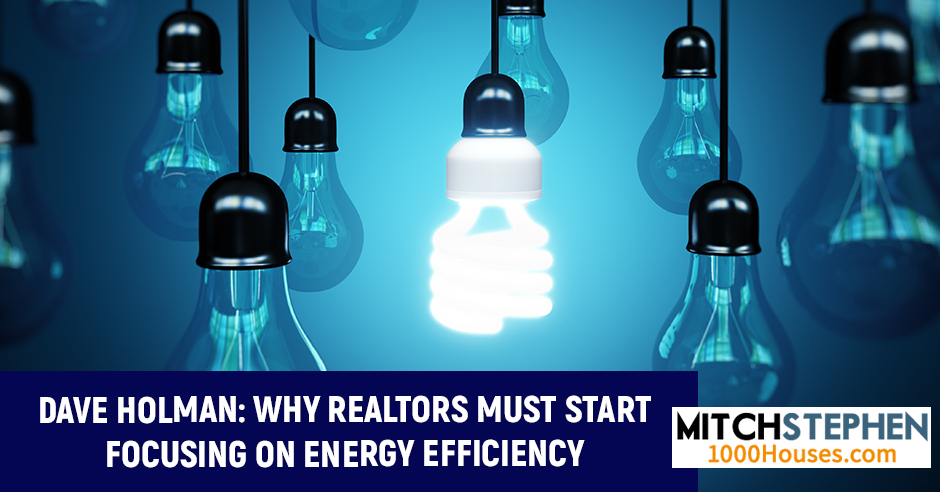PODCAST
Dave Holman: Why Realtors Must Start Focusing On Energy Efficiency
Episode 434: Dave Holman: Why Realtors Must Start Focusing On Energy Efficiency

Most real estate investors pay attention to the property’s aesthetic and price. However, not everyone gives that much love to its level of energy efficiency. Dave Holman joins Mitch Stephen in discussing how concentrating on real estate’s less sexy aspects such as insulation can drastically cut costs and increase a property’s value. Dave also shares a few tips for newbie realtors, his experiences in providing aid to immigrants through the real estate industry, and his thoughts on how the government must take care of this struggling demographic.
—
I’m here with Dave Holman. We’re going to talk about how to increase your ROI by increasing the energy efficiency in your places. If you don’t have a self-directed 401(k) or IRA or Health Savings Account or educational account, someplace where you can grow your finances, tax for your tax-deferred even, then you’re missing this huge tool in your tool belt. Please check out TaxFreeFuture.com, you won’t believe what your financial advisors aren’t telling you. Find out how you can take little bits of money in your retirement plans and make them into astounding amounts using some of the strategies we talk about on this show in real estate. Dave, you’re over in Maine?
I’m up in the beautiful state of Maine.
One time I was traveling through Maine for a company and I was working for another company. The van that I was traveling in all over the countryside, broke down in Maine. I don’t remember where it was, but I remember there was not a lot of auto garages around. Some very nice people took me to this place where it was like one golden pond. I got to stay in this cabin and there was a moose head over the top of my bed that if it ever fell, it was going to kill me. It was huge. I stayed there for three days because it took them a day to get a tow truck out there and to get it back. They took it to this dealership. They worked on it and took them another day to get back. I got to spend 3.5 in paradise with nothing except this pond, fish pole, and cabin. It was one of my highlights of that job. I was in there for five years. They were nice people there in Maine.
We put out the little tack mats to catch a lot of people like yourself and we welcome everyone to the state. It’s a laid back place with a laid back way of life and friendly people, but I’m glad you had the chance to visit.
I was going to pass right through. I probably wouldn’t even have got the experience and I got to experience. It was great. Tell us a little bit about your history. Your relationship to real estate, and how you got there so we can all get on the same page with you.

Energy Efficiency: No bank that you deal with will ever give you the best rate right off the bat.
I grew up in Maine in a middle-class family, owned family home, didn’t do any real estate investing as a family business or anything. I studied a little bit of architecture in green building energy efficiency in college. I came to understand wind turbine economics and the benefits of installation. I spent the next four years in South America and Bolivia, starting a chain of camping stores with my wife who’s a Bolivian. I’m your typical guy for Maine and average path in life so far. We got to the point where we had three retail stores, ten employees, and I had only taken one economics class my whole life. I thought I needed an MBA, came back and went to grad school here in the US. It turned out I needed to learn to account. That was the real piece that I’d been missing.
I went to non-profit leadership and doing fundraising development. First for a small nonprofit, helping kids in the Guatemala City garbage dump go to school, and then for Bowdoin College up here in Maine. During that time, I realized quickly the nonprofit world is wonderful and soul-fulfilling, but it is a bank account fulfilling for the employees and people working there. I needed to do something different. I started in 2011 as a passive investor. A friend of mine from Minnesota who did go on to become an architect, that I met in college was going to build an 80-unit apartment building with these two other developers and sent me the offering.
I looked at it and thought, “This seems too good to be true.” I’m a stock investor, 7% or 8% a year is great, and this is offering 18%. I thought to myself, “Even if they’re wrong and they only do half as well as they think they will, 8% to 9%, that’s still a good return on your money.” I gave him a big chunk of the little savings I had and said, “I trust you. Show me how it works.” I started getting quarterly reports, dividend checks, and payments. That helped. It was tax-free. They did it right and used appreciation. That spark inside me. Later on, in 2013, I partnered with a family who had some capital to spend. I had no money on my own to buy a single-family house as an investment house in a town near where we live and did that again in 2016.
Real estate calls you to be a shopper and a consumer of financing. Share on XAt that point, I dove into the learning. That was the point where my wife had gotten pregnant with our first child. I had the motivation to take this seriously. I started reading blogs like yours, reading books multiple hours a day on my commute, mowing the lawn, and washing the dishes. Every free second I had was studying real estate. I bought a three-unit on my own and then started partnering with people with capital to buy 8 or 9 units. I started doing larger group investments called syndications. We did $1 million here, another $1 million there, and we completed $3.5 million up here in Maine. It’s a 26,000 square foot mixed-use building. That’s the trajectory that’s led me to where I am in real estate investing. I went full-time in 2019. I held onto my day job a long time. I had dozens of units by the time I finally hung up my boxing gloves and retired my number.
That was scary to leave all the insurance and all the bill that handcuffs.
Ours were particularly soft and cushy because our children attended the daycare at the college. My wife got a job there, so we could get the few extra years of the daycare and the healthcare as well as I pulled back. We’re still affiliated, we’re still involved in the W-2 world, but I’m happy to say it’s very much by choice and we’re not feeling under pressure about it.
You’re doing it because it’s beneficial and it makes sense. If it ever needs to come to an end, or it comes to an end, that’s fine too then. You’re going to be offering seven free tips. What are those tips to do with?
There are oriented people starting in real estate investing who maybe have 0 to 10 properties. They could be single-families or small multifamilies. There are some things that are not always surface-level evidence. For example, one of them is to shop around for your financing. Don’t just go to the first bank you walk into, sit down and take their loan because no bank that you deal with will ever give you the best rate right off the bat from the beginning. That’s not how it works, how car sales work, and how any sales work. You need to be a shopper. You’re a consumer of financing. I didn’t learn to think of myself as a financing consumer until many properties in. I went with the same local bank and I do always recommend local banks.
That’s another tip is that if you sack up with Wells Fargo or Bank of America when the you-know-what hits the fan and you’re trying to call and email them, good luck in getting mercy with all exceptions or compassion because they’re running a business and they see you as a source of liquidity. Whereas local banks, they’re a portfolio lender, keep things in-house, want to see local business and business people thrive. They’re much more likely to work with you. If they or you or the economy encounters the challenges that we’re seeing front and center in 2020.
I got started by a friend who was my high school quarterback and he saw what I was doing, called me in, asked me if I needed some money, and gave me a loan. I never stopped him because I never would’ve had a loan without him. He brought me under his wing. I was a loyal person. One day, he left that bank, and about fourteen other people went in fourteen different directions to fourteen other banks and in that bank. All of a sudden, I knew 15 people at 15 different banks that knew me, my business, and my reputation for twenty years. I was a free agent for once because I was never going to go into this guy and say, “There are other banks got a half a point on you. I’m going to go with them.”

Energy Efficiency: Loan officers can sometimes make their own rules and sell it to their superiors if they think you’re a good gamble to take.
I wouldn’t. The guy changed my life and I’m loyal that way. When they split up, I started shopping and I was like, “I had no idea the differences there could be and the arguments you could make like, ‘We’re going to have a balloon in four years. I’m not looking for a fifteen-year with a balloon. I’m not looking for a loan with an adjustable-rate every five years. I’m not looking for it.’” No one’s going to do that. “Someone over here will.” They all try to tell you that no one’s going to do that. I always find someone to do it.
There’s a huge diversity of policies out there in the banks. Loan officers, especially, the more experienced ones carry a lot of weight. They can sometimes make their own rules and sell it to their superiors if they think you’re a good gamble to take.
Especially, if it’s under certain amounts. I know one guy, if it’s under $3 million, then he didn’t have to ask anybody about anything. If he wants to make the loan, he makes the loan. The other thing is I learned the hard way. I buy houses for $50,000 and sell them for $100,000. I get $10,000 down. I carry the $90,000 at 10% for 30 years. They pay me on $90,000 at 10%, for 30 years. I got to pay my private lender for 8% for 10 years. I keep this thread. I have all these notes laying around. I hypothecate these notes, which is a fancy word for saying, I pledged my notes as collateral to cash out my 8% in private lenders and get a 4% or 5% loan that’s fixed for fifteen years.
I do this all the time, but I was going to every bank one at a time. When they tell me, “No,” I would take my hat and say, “Thank you for your time.” I would leave. Never thought to ask the bank, “Do you know someone who wants this loan?” I figured they were all competitors and they all hated each other and it would be like, “Can you tell me a competitor of yours that would help me?” I thought, “That’s not right to do that, to ask them that.” It was completely wrong. All these bankers work with each other all the time like my guy. He was at a bank and there were fourteen of them and then they all went in fifteen different directions.
All these bankers know each other. They all know what their bank will do and what they won’t do. They all know what everyone else’s bank will do and what they won’t do because it’s their job. Bankers are happy to say, “If I can’t help you, let me direct you to the guy that can help you in this other bank,” because they figure, at least they were helpful to you. You might remember their graciousness on another loan that they would do. If I asked these lenders, I had to go to 27 banks to find three people that were interested in what I did. If I had to ask the first two who does this in town, they would have told me the three.
Leading with questions and being curious is one of the hardest things for me to do as an adult. It’s one of the most important things to hang on to. Don’t lose that almost childlike curiosity, and willingness to put your foot in your mouth and say, “I’m new here. Help me understand what is possible or where I should go?” People are always happy to help you. Your point about loyalty is an important one as well. Loyalty to banks is important and the people there. It’s okay to shop, know the going rates, keep them honest, and you feel great. You’re going back to the same person, you know that there’s a minor difference in loan amount that you might be.
I don’t always go with the lowest rate. Sometimes there’s a term or there’s something else I needed, or there’s a convenience that I need or sometimes they’ve done me some other favors and I owe them a thing or two like, “That guy has been good to me. I’ve taken his time on a lot of stuff. I’ve learned stuff from this guy. He introduced me to important people. I’m going to go ahead and get him the loan, even though he’s not the cheapest.”
While we’re on the topic. My high school quarterback was the CEO of the bank much later down the years do the documents. I’m not suggesting anybody live like this. At that time, he was my friend and I wasn’t going to get a loan without him. It didn’t even matter what the paper said. I said, “Give me the loan that’s shorter.” He says, “It’s this much interest, it’s this and you’re going to balloon on this day. You’re not going to read it or take it to the lawyer?” I said, “That pretty much knows what it says and it’s fine. Print down here.” He goes, “What does it say?” I said, “It says, I have my testicles over some high line wires, and whenever you all want to turn on the electricity and fry, you can fry me on any given day anytime you want. Is that much what it says?” He goes, “Yeah. That’s what it says.”
Don't lose that almost childlike curiosity and willingness to put your foot in your mouth. Share on XThe interesting part of the process that I’ve come to is as the deals I’m involved with getting bigger and I’m raising more of other people’s hard-earned money, I’m being more careful to read those documents. Not even that I can fully understand them because they’re in a different language called a legal lease. Working with a team of people, my attorney, financing guru that I can go-to. They’ll read it for me, with me and they’ll advocate for me with the bank and say, “This is a weird term. This isn’t usually in there. Take it out. Let’s do X, Y, and Z.”
I do that too. I have people. I pay $200 for someone to read it and, “Tell me what jumps out at here, Mac. What’s going on? I’m not going to read this thing. I can’t understand the thing.” One of the things about banks is they like to dictate everything that’s going to happen. Do you have a lot of private money? I love private money because I get to tell them what I want and they decide whether they want to play or not. The banks are telling us how it’s going to be. They’re more flexible than you might think if you’ll call them out on it, but not nearly as flexible as private people. Private people are like, “This is the plan. Do you want to do it or you don’t want to do it?” They’ll say yes or no?
I am raising private capital, but I haven’t taken that in the form of debt yet. I’ve used it as equity in the deals that I’m doing. It’s a little bit of a chicken and egg question of like, “I didn’t know, people and have a good relationship with people who could be the bank on a $3 million deal yet.” Now, I’m starting to gain more of those people in my network and be able to do that in the future. I love the flexibility, simplicity, speed, with which that arrangement can work.
You got started by like a lot of us, learn a lot of things. We stumble into something. It’s pleasurable. You start looking into it a little bit more and then you start to progress. Why the fascination with energy efficiency?
I studied a lot about this in college and learned that we’ve got a lot of environmental problems in our hands and a lot of them are getting worse and it’s because of the way we live and we do business in the modern age. It’s not that we’re evil or bad people trying to destroy the climate or the earth, the water, the air, etc. We have the engineering of it wrong. We’re learning better in more efficient ways to build, to do, and to make everything. All of the cars we drive now, light-years more efficient than the cars we drove many years ago. It same will be true in the future. The same is true of buildings. The built environment that we are creating now is using a lot of different technology, and one of the big pieces is one of the least sexy things you’ve ever heard of, which is insulation.
We’re starting to understand that insulation, both for cooling and for heating can radically change the equation. Going back to the promo you did, paying the bills at the beginning of the show for taxes. Taxes are going to be much your biggest expense as a real estate investor and as a private individual. Your second biggest line item on that budget is often utilities. It’s often the heating cooling. If you’re in a cold climate like we are, you’re going to be spending 20% to 30% of all your expenses are probably going to heating in that building. Similarly in the South or other places, you’re providing a chiller, you’re doing cooling. If you can insulate the attic in Northern climates, the basements, think about the air ceiling and the way that utilities are metered and who’s paying that bill. You can cut your expenses in half, over a 2 to 3-year period. You can drive NOI, Net Operating Income, for those not familiar with the jargon. You can increase your profits dramatically by investing efficiently.
That increases the value of your property if you ever go to sell it because it’s based on NOI if you’re doing it selling on a cap rate.
I’ve added around $1 million of value to my portfolio through the least sexy stuff imaginable like insulation. It’s taking big fat multi $1,000 heating and cooling bills and exiting them out forever. A lot of times you’re heating common areas that don’t need to be heated if they’re well-insulated or basements. A lot of basements in a Northern climate aren’t insulated and they get so cold, the pipes might freeze. People decide, “We got to heat the basement and that’s crazy.” All you have to do is spray foam around the edge. The walls of the basement have a nice tight door and windows and you’re done. You can save $5,000 or $10,000 or $20,000 a year, depending on the size of the building. Many investors don’t think about that.

Energy Efficiency: The built environment that the real estate industry is creating now uses a lot of different technology.
They take as given energy costs. They’re given at the start and don’t drill down and say, “Is that even necessary?” Look at your market. If you’re a market where sometimes the tenants pay their own heat or cooling via the electric bill or propane oil, gas, etc. It’s almost always preferential to the landlord to have the tenant paying that bill. They will be much more frugal with their use of that utility than if the landlord’s paying. You’ll see windows open in February because the person below them has the temperature too hot. It’s getting too hot in their apartment. “Open a window. It’s no big deal.” Even though it’s negative 10 outside.
I was reading in your bio and you mentioned that you rent a lot to immigrants. Talk to me about that.
It’s near and dear to my heart because my wife is an immigrant from Bolivia and became an American citizen. It’s something that we had to go through firsthand. Portland, Maine got a big influx of immigrants from Africa in the summer, 2019 to the point where the city couldn’t house them all. They were showing up and buses having crossed the Rio Grande through Mexico opening the border for them. There were 200 or 300 people. At that time, I had a vacancy. I thought to myself, “These people came here to work. They came fleeing violence and terrible things and famine in their own countries. This is the land of the American dream where everyone deserves a shot.”
I’ll give him a shot. I called up the city officials and said, “I’ve got a vacancy. I understand these people have no background, no credit, don’t speak English, but is there any way they could ever pay rent? I’m not running a charity, but I’m willing to work with you to place a family here.” Quickly, they found a family who was in a homeless shelter who had green cards. They’d come legally. They could work already. They spoke some English from Rwanda. We placed them in our unit. They got their first month of rent paid by the local authorities.
By the second month, they had two different jobs each of them, working day and night, they were paying market rent, they learned to drive, bought their own car, and their kids are in the same daycare as mine. It was a dramatic story wherein a short amount of time, you give good hardworking people a chance. It’s like, you poured miracle, grow on a little plant. I’ve done this five times now with immigrant families and some of them are our best tenants.
I sell houses with seller financing. That’s my unique proposition. I sell my houses with a 10% down payment or better. I carry the paper for 30 years. My PITI payments are about equal to plus or minus a few dollars, whatever the rent is for the same property right across the street. The separator is, “Do they have a down payment?” I’ve done it hundreds of times with immigrants usually from Mexico because we live in San Antonio, Texas. We’re on that. We’re close to the border. Our population is 65% Hispanic. We do it all the time. There’s something to be said for first-generation immigrants. Think of what that entails, to begin with. You’re leaving a place where everything’s familiar and going to someplace where nothing is familiar, not even your language. These people have a tremendous amount of drive, commitment, and reason to do what they’re doing.
Real estate is so much more than a way to make money. It's a way to build a community. Share on XThey are dynamic hard workers. They crave, seek, and find work. You want to help a person like that. My name is not Mitch Stephen. My name is Mitch Stephen Van Eck my grandfather on my father’s side was Joe Stephen Van Eck. He couldn’t get a job back in The Great Depression because he was an immigrant. That tiff with new immigrants has been going on since the dawn of time. He had to drop his last name and drop his accent so that he could get work. It’s a great country. I understand why people want to come here. I prefer that they come for the right reasons and come the right way. I’ve got nothing against anyone coming here because we need them. That’s what this whole country is built on. Being in a position like you to give people that most basic need, a place to lay their head that is decent and safe was a tremendous first step for anybody coming here for the first time.
There aren’t that many times in real estate where you get that feeling in your heart, that you made a difference. I’m sure the same way when you see your family is owning their own homes and paying off these notes, succeeding and developing lives because of that little trust in them. We gave them that a bank wouldn’t, that’s cool. It makes it much more than a way to make money. It’s a way to build community.
I remember one closing. I was there at the title company and income the family. They didn’t speak English. We had a translator there and they were dressed up to the nines. Long dresses, hair did and it was a man, his wife, and four kids. They were all dressed in their finest. We might have not seen it as fine, but it’s the best they had. They signed their papers, cried, and took their picture with their papers in their hand.
We left. The guy goes, “What the hell was all that about?” I said, “That they got dressed up?” He says, “That was weird.” I said, “It wasn’t weird. They’re proud. They came from a place where they lived with dirt floors.” It’s not unusual for people that I sell houses to have come from a place where they do have dirt floors. I imagine the people that you sell the house, likely had dirt floors, don’t you think?

Energy Efficiency: Real estate can allow you to help people change their lives for the better and transform the neighborhoods you live in.
Quite a few. They have a certain appreciation for the work you do for them as a landlord and the effort you put in that sometimes other tenants may not. They’re willing to work. I often have them pay to do the lawn mowing or taking care of the property because they’re hungry. They want to do things and they don’t see little things as beneath them. They see it as a commodity transaction. They don’t have that feeling of ownership, but the tenants you find that can have ownership and treat it like their own home, that’s what you want.
The word that might’ve been escaping, was entitlement. They don’t have an entitlement mentality which is hard to live with as a financier or a landlord. That entitlement mentality sucks. You got to learn to recognize it and stay away from it.
It’s been a gratifying path and we all come from families that have immigrants unless you’re Native American. You benefited from it at some point. We need to try to keep this country a place that’s dynamic and allow people to get a fresh start that is able and willing to do so. My solution to immigration would be super simple. I see it as a supply and demand problem where there’s a demand for work visas. That’s 10 or 100 times greater than what we’re supplying, bring them out of the shadows, get them legalized, get them working and bring it all out in the open, but I’m not in charge. Politicians will keep it screwed up for a while.
That’s one thing you can count on. As long as there are politicians, it will be screwed up. Everyone, go to 1000Houses.com/holman and then check out the seven tips that Dave has for you on getting started. As we wrap it up here, Dave, what would you like to say to the new guy out there that’s trying to find his way?
My advice to people getting started is that this can be much more than a business and than a money-making tool, it can be a way for you to help people change their lives for the better and transform the neighborhoods, the communities that you live in. You can be a part of that change and that will provide you a lot more fuel than maximizing profits. You want to do both, but your ability to have a direct positive impact on your hometown, your neighborhood, wherever you’re investing is powerful. I encourage everyone to get started. Don’t hesitate. There’s always a good deal in any climate that you can go and find and get started with.
I’d like to thank everybody for stopping by to get you some Dave Homan. Check out that seven tips. Also, check out TaxFreeFuture.com. You won’t believe what your financial advisors aren’t telling you. They’re the sponsor of the episode. It’s all about getting a self-directed retirement fund that is tax-deferred or tax-free. If compounding interest is one of the wonders of the world, then tax-free money might be another wonder of the world.
We’re going to tell you what your financial advisors are not telling you, why they’re not telling you, and you can do with what you want. You’re going to be amazed at those little 37 video vignettes that show you all the possibilities. You got to be excited if you’re thinking about growing a financial, retirement plan, or growing your finances. It’s got to make you excited. My friend, thank you. I appreciate you for being on it. It’s been wonderful and I hope to see you again. We’ll check-in soon.
That’d be terrific, Mitch. Enjoyed it. Thanks a lot.
Important Links
- 1000Houses.com/holman
- 1000Houses.com/TFF
- 1000Houses.com/Livecomm
- 1000Houses.com/100
- 1000Houses.com/101
- Dave Holman
About Dave Holman

Dave started in non-profit leadership, bought his first single-family house in 2013, and now has a growing portfolio of 94 units including residential, commercial, retail, restaurant, and office.
Love the show? Subscribe, rate, review, and share!
Join the Real Estate Investor Summit Community:











